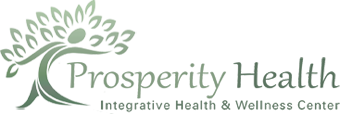Stress Management Doctors Can Help to Get You Through the Holidays
Stress Management is More Than Just Getting Some Rest!
The holiday season, while joyful, ranks among the most stressful times of year for most people. Between shopping, cooking, hosting, traveling, family dynamics, and financial pressures, the holidays can feel overwhelming. Unfortunately, this stress adversely impacts health, relationships, and emotional wellbeing. Chronic, uncontrolled stress contributes to serious health problems including heart disease, weight gain, metabolic syndrome, depression, and weakened immune function. Reducing stress levels not only makes you feel better right now – it protects your long-term health.
At Prosperity Health in Royal Oak, stress management specialist Dr. Nishath Hakim takes a holistic, integrative approach to controlling your body’s stress response. As a functional medicine physician and stress management doctor, Dr. Hakim provides instruction in powerful relaxation techniques while addressing underlying factors that amplify stress responses. She recommends natural supplements when needed to calm the mind, combat insomnia, and enhance mood, increasing your ability to handle holiday pressures. Through personalized treatment plans, patients learn to manage stress effectively rather than letting it control their lives.
Dr. Hakim has helped hundreds of patients manage chronic stress using an integrative functional medicine approach. She evaluates you as a whole person, identifies underlying causes of your stress responses, and helps you get the right treatments and make appropriate lifestyle adjustments to manage stress, restore energy, and reclaim your health and vitality.
Symptoms of Unmanaged Stress
Recognizing how stress manifests in your body represents the first step toward managing it effectively. Stress management specialists identify both physical and emotional symptoms that indicate your stress response has become problematic. Physical symptoms include persistent fatigue that doesn’t improve with rest, frequent headaches or migraines, muscle tension especially in neck and shoulders, digestive problems like stomach pain or IBS, and frequent colds or infections from weakened immunity.
Sleep disturbances signal unmanaged stress – difficulty falling asleep, waking frequently during the night, or waking early and being unable to return to sleep. Appetite changes occur, with some people eating significantly more (especially comfort foods high in sugar and fat) while others lose appetite entirely. Weight gain, particularly around the midsection, often accompanies chronic stress due to elevated cortisol levels.
Emotional and cognitive symptoms include persistent anxiety or worry, irritability or short temper, feeling overwhelmed by ordinary tasks, difficulty concentrating or making decisions, and racing thoughts that won’t quiet. Some people experience panic attacks, while others feel emotionally numb or disconnected. At Prosperity Health in Royal Oak, stress management doctor Dr. Hakim helps patients recognize their stress symptoms so appropriate interventions can address the root causes.
Dangers of Unmanaged Stress
Beyond making you feel miserable, chronic stress poses serious health risks that justify seeking help from a stress management specialist. Cardiovascular disease risk increases significantly with chronic stress. Stress hormones elevate blood pressure, increase heart rate, and promote inflammation – all factors contributing to heart disease. Studies show that chronic stress doubles heart attack risk.
Metabolic problems develop from prolonged stress. Elevated cortisol promotes insulin resistance, contributing to type 2 diabetes development. Stress hormones also signal fat storage, particularly dangerous visceral fat around organs. This explains why stressed individuals gain weight even without eating more – their hormones promote fat accumulation. Metabolic syndrome, characterized by high blood pressure, elevated blood sugar, excess abdominal fat, and abnormal cholesterol, often develops from chronic stress combined with poor lifestyle habits stress encourages.
Mental health suffers under chronic stress. Depression and anxiety disorders often develop or worsen with sustained stress. Cognitive function declines, with memory and concentration particularly affected. Sleep problems compound these issues, creating vicious cycles where poor sleep increases stress, which further disrupts sleep. At Prosperity Health in Royal Oak, Dr. Hakim addresses these interconnected problems through comprehensive stress management approaches that support both physical and mental health.
Holistic Medical Stress Management
Functional medicine stress management differs from conventional approaches that simply prescribe anti-anxiety or sleep medications without addressing underlying causes. Stress management specialist Dr. Nishath Hakim evaluates multiple factors contributing to your stress response – hormonal imbalances, nutritional deficiencies, sleep disorders, lifestyle factors, and underlying health conditions that amplify stress effects. This comprehensive assessment guides personalized treatment.
Testing may include hormone panels assessing cortisol patterns, thyroid function, and sex hormones that influence stress resilience. Nutrient testing identifies deficiencies in magnesium, B vitamins, vitamin D, and other nutrients crucial for nervous system function. Sleep studies may be recommended if sleep disorders compound stress problems. This data-driven approach ensures treatments address your specific imbalances rather than providing generic stress management advice.
The holistic approach combines evidence-based relaxation techniques, nutritional support, targeted supplementation, lifestyle modification, and when appropriate, referrals to mental health professionals for therapy or counseling. This multi-faceted strategy provides more effective, sustainable stress management than any single intervention alone. At Prosperity Health in Royal Oak, patients receive personalized stress management protocols designed for their unique situations and needs.
Stress Management Relaxation Techniques
Learning effective relaxation techniques provides immediate tools for reducing stress responses. Stress management doctor Dr. Hakim teaches patients various evidence-based techniques, allowing you to discover which work best for you. Deep breathing exercises activate the parasympathetic nervous system, triggering relaxation responses that counter stress hormones. Simple techniques like 4-7-8 breathing (inhale 4 counts, hold 7, exhale 8) can quickly calm anxiety.
Progressive muscle relaxation involves systematically tensing and releasing muscle groups throughout the body, reducing the physical tension stress creates. This practice also increases body awareness, helping you recognize when stress is building before it becomes overwhelming. Mindfulness meditation trains attention to stay present rather than worrying about future or past events. Research shows regular mindfulness practice reduces cortisol levels and improves stress resilience.
Guided imagery uses visualization to create mental experiences of peaceful, calming environments. This technique particularly helps people who struggle with traditional meditation. Biofeedback training teaches conscious control over physiological stress responses like heart rate and muscle tension. At Prosperity Health in Royal Oak, stress management specialist Dr. Hakim provides instruction in these techniques and may recommend apps, classes, or practitioners who can support your practice.
Stress Management Diet and Supplements
Nutrition profoundly affects stress resilience and stress hormone levels. Stress management doctors recognize that certain dietary patterns exacerbate stress while others support healthier stress responses. Processed foods high in sugar and refined carbohydrates cause blood sugar swings that trigger stress hormone release. Chronic caffeine consumption can worsen anxiety and disrupt sleep, creating a stress management challenge.
Anti-inflammatory diets rich in vegetables, fruits, whole grains, healthy fats, and lean proteins support better stress management. Omega-3 fatty acids from fish have anti-inflammatory effects that benefit brain function and mood. Magnesium-rich foods like leafy greens, nuts, and seeds support nervous system function and sleep quality. B vitamins from whole grains, legumes, and animal products are crucial for energy production and neurotransmitter synthesis.
Natural supplements can enhance stress management when diet alone isn’t sufficient. Magnesium supplementation helps many people with stress-related sleep problems and muscle tension. Adaptogenic herbs like ashwagandha and rhodiola support healthy cortisol patterns and stress resilience. L-theanine, an amino acid from tea, promotes relaxation without drowsiness. At Prosperity Health in Royal Oak, stress management doctor Dr. Hakim recommends specific supplements based on your test results, symptoms, and needs rather than generic protocols.
Stress Management and Lifestyle Modification
Beyond diet and relaxation techniques, broader lifestyle factors significantly impact stress levels. Regular physical activity represents one of the most powerful stress management tools available. Exercise reduces cortisol, releases endorphins, improves sleep, and provides healthy outlets for stress-related tension. Even moderate activity like walking provides significant benefits – you don’t need intense workouts to experience stress reduction.
Sleep optimization becomes crucial since stress and poor sleep create vicious cycles. Establishing consistent sleep-wake times, creating dark, cool sleeping environments, avoiding screens before bed, and addressing sleep disorders all contribute to better rest. Quality sleep improves stress resilience while reducing stress improves sleep quality.
Social connections buffer stress effects. Isolation amplifies stress while supportive relationships provide emotional resources for coping. Making time for relationships despite busy schedules pays dividends in stress management. Setting boundaries – learning to say no to excessive commitments, limiting exposure to toxic relationships, and protecting personal time for rest and renewal – also proves essential for managing holiday and ongoing stress. Stress management specialist Dr. Hakim at Prosperity Health in Royal Oak helps patients identify lifestyle factors undermining their stress management efforts and develop realistic plans for positive changes.
Stress Management Referrals to Mental Health Professionals
While functional medicine stress management addresses many underlying factors, some patients benefit from psychological support from licensed mental health professionals. Stress management doctor Dr. Hakim recognizes when therapy or counseling would enhance treatment outcomes and provides appropriate referrals. Cognitive-behavioral therapy (CBT) helps patients identify and change thought patterns that amplify stress. This evidence-based approach teaches practical skills for managing anxious thoughts and behavioral responses to stressors.
For patients with trauma histories contributing to stress responses, specialized trauma therapy may be recommended. Depression that develops from chronic stress often requires professional mental health treatment. Couples or family therapy can address relationship stress, particularly important during holidays when family dynamics intensify. At Prosperity Health in Royal Oak, Dr. Hakim maintains relationships with qualified mental health professionals and coordinates care to ensure patients receive comprehensive support for stress management.
Stress Management in Royal Oak
If holiday stress or chronic stress is undermining your health, relationships, and quality of life, specialized help is available. At Prosperity Health in Royal Oak, stress management specialist Dr. Nishath Hakim provides comprehensive, integrative approaches addressing the physical, nutritional, and lifestyle factors affecting your stress response. Through personalized treatment plans combining relaxation techniques, nutritional support, appropriate supplementation, and lifestyle guidance, you can regain control over stress rather than letting it control you.
Don’t let stress rob you of enjoying the holidays or compromise your long-term health. Schedule a consultation with stress management doctor Dr. Hakim to discover how functional medicine approaches can help you manage stress effectively, restore your energy, and reclaim your health and vitality this holiday season and beyond.






